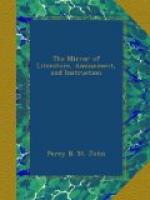Vide Crofton Croker.
Ay! o’er them shall the soft wind
blow,
And kiss their lips of bloom—
The fair, the bright in sunset’s
glow;
—Plant roses on
my tomb.
The cypress is a mournful tree,
And bodes an early doom;
But lovely eyes shall weep o’er
me;
—Plant roses o’er
my tomb.
When feverish dreams assail with dread
The bosom’s haunted
gloom,
Oh, why should we lament the dead?
—Plant roses on
my tomb.
The birds shall sing, amid their leaves,
To skies of richest bloom;
But cypress-shade the spirit grieves;—
—Plant roses on
my tomb.
I loved them when a careless child,
And bless’d their deep
perfume,
When lute and song my dreams beguiled;
—Plant roses on
my tomb.
The fragrance touch’d with golden
light,
And beautified with bloom;—
Oh, plant them in the sunset bright,
To consecrate my tomb.
R.A.[8]
[8] Our correspondent assures
us that the above lines were
written
many months before “The Tribute of Roses”
appeared in
the
Literary Gazette.—See Mirror,
vol. xvi. page 176.
* * * * *
HALCYON DAYS.
(To the Editor.)
In illustration of your correspondent P.T.W.’s article, entitled “Halcyon Days,” in No. 471, I beg to furnish you with the following, from a friend’s album:—
There is a bird, a little bird, of plumage
bright and gay,
Free as the tenants of the sea, free as
its finny prey;
In wintry storms she lays her eggs, the
briny sands among,
And twice seven days sweet calms succeed
where billows roared along.
These are the sailor’s Halcyon
Days, when pleasure’s on the main;
The young ones hatched, the storm appears,
and Boreas rules again.
H.H.C.
* * * * *
ORIGIN OF THE ENGLISH TITLE
“DUKE OF CLARENCE.”
(To the Editor.)
In No. 437 of the Mirror, is an account of “Clarence and its Royal Dukes, " which seems to imply that the title is derived from a town in Suffolk; but according to a recent traveller, the origin is of much older date, having descended by marriage, from the Latin conquerors of Greece. He thus describes the ancient town of Clarentza:—“One of the most prominent objects was Castel Tornese, an old Venetian fort, now a ruin, but in former days affording protection to the town of Chiarenza, or Clarentza, which, by a strange decree of fortune, has given the title of Clarence to our Royal Family. It would appear that at the time when the Latin conquerors of Constantinople divided the Western Empire amongst their leading chieftains, Clarentza, with the district around it, and which comprised almost all of ancient




